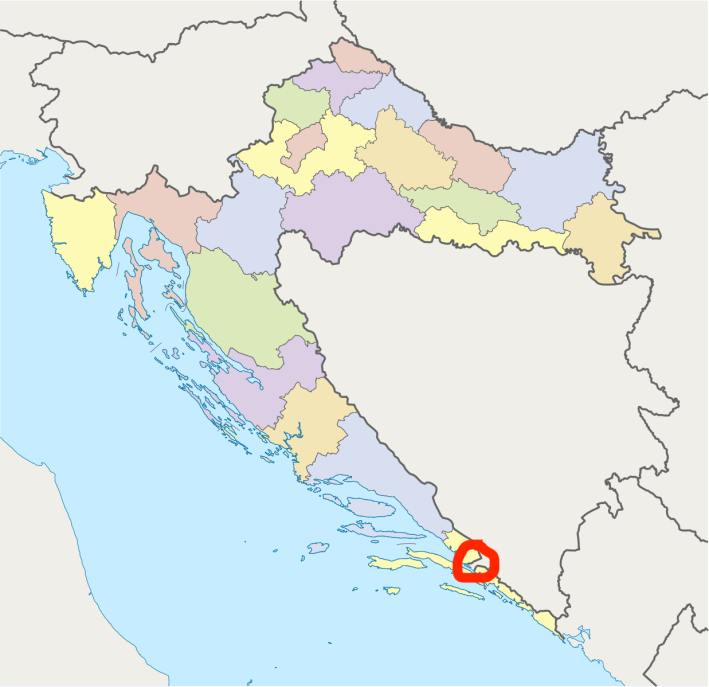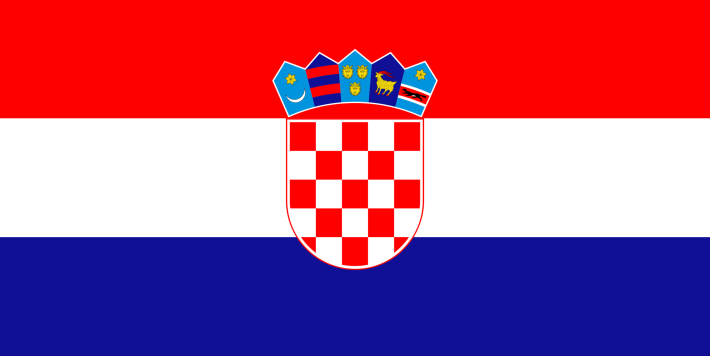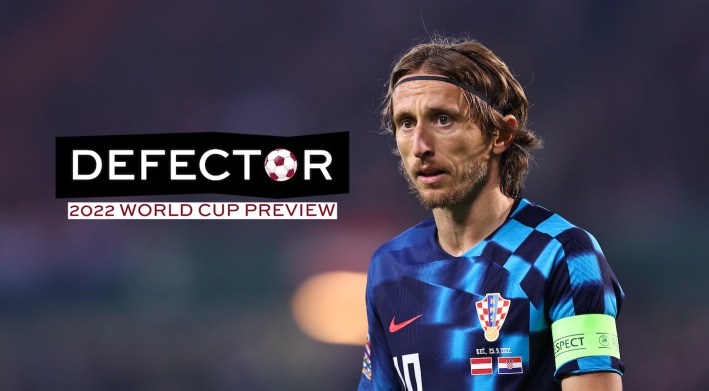It’s almost time for the 2022 World Cup. To help get you ready, we will be providing you with precious information about every team in the tournament. You can read all of our World Cup previews here.
Croatia had a dream run in the 2018 World Cup. The Blazers were nearly immaculate in the group stage, taking all nine points, pounding Argentina 3-0, and only conceding a single goal, to Iceland. They played a weird, tense round-of-16 match against Denmark: Both teams scored fluky, ragged chaos goals within the first five minutes, then neither came all that close to scoring again before a similarly ramshackle penalty shootout—the teams combined to miss half their 10 attempts—went Croatia's way. Another janky shootout win over the Russian hosts in the quarterfinal gave Croatia strong team-of-destiny vibes; they went into the semifinal on a huge wave of global goodwill, and not only because they carried with them the world's hopes of seeing England eat a mountain of shit.
And holy hell, did they ever see to that:
No goals in the draw between Croatia and England.....
— JAKE BUCKLEY 🇦🇺 (@TheMasterBucks) October 12, 2018
So let’s just watch Mario Mandzukic’s Goal again then. pic.twitter.com/yPcI87CeNM
That's Mario Mandzukic knocking in the 109th-minute goal that secured Croatia's place in the final and dumped England back into the toilet for at least another cycle. Conservatively, I have watched replays of this goal 20 times this morning, and 250 times in the past four years. Mandzukic would have won an election for president of Earth if it had been held just then. I'd have taken my brain out and handed it to him if he asked for it.
The final didn't go the Checkered Ones' way: France, impossibly stacked with star power, simply had too much juice for a Croatia team that, for all its valor and ingenuity, lacked real goal-scoring firepower and had advanced that far on its ability to convert at the very end of brutally close-contested matches with few goal-scoring chances for either side. Ah well. It was an electrifying run, the greatest in a World Cup in the relatively brief history of Croatia's national team, which had not existed in any formal way until shortly before the nation declared its independence from Yugoslavia in 1991. Midfielder Luka Modrić, whom we will talk about some more in a moment, won the Golden Ball, awarded to the tournament's best player.
If the 2018 run represents, thus far at least, the peak of perhaps the shiniest golden generation of soccer players Croatia ever produced, then the 2022 World Cup run, however long it turns out to be, represents that generation's farewell. Mandzukic retired from international soccer after Russia, and then altogether in 2021; he's on the national team's coaching staff now. The splendid midfielder Ivan Rakitić abruptly gave up international soccer before Euro 2020. National-team mainstay forwards Ivan Perišić and Andrej Kramarić are 33 and 31 years old, respectively. And the 37-year-old Modrić, the greatest Croatian player of all time, has said that Qatar will be his last international tournament.
It may be a steep fall for Croatia, after that. The players who'll headline the national team after Modrić et. al move on are already nearing 30 themselves and likely do not have more than one Cup cycle left in them. The following generation, such as it is, features very few players of consequence under the age of 25—and, well, few players of consequence over the age of 25. It's a small nation, after all, Europe's 30th largest by population according to the United Nations, and almost certainly has been punching well above any sustainable weight. No country on earth produces a steady supply of Luka Modrić-grade players, but Croatia may be doubly blessed ever to have produced one at all.
Population size isn't strictly determinative in international soccer—Portugal hovers around 10 million; Russia around 15 times that—but it seems worth noting that no European country of similar or smaller population has come close to matching Croatia's national-team success over the past 20 years. Its ultimate soccer profile probably is similar to Group F opponent Belgium (triple Croatia's population): hoping to squeeze one last heroic World Cup run out of a generation that would be anomalous for any nation but might be straight up miraculous for a smaller one, and likely facing sharply diminished prospects for some time after that.
Who Is Their Main Guy?
I feel like I sort of gave this away. It's Luka Modrić.
Modrić is a dream of a midfielder; it feels absolutely ludicrous to try to list his areas of strength. No one is a greater master of tempo and timing than Modrić, whether calmly organizing a breakout from the back, or smoothly retaining possession and ensuring the ball's transit through the middle of the pitch into areas of danger, or finding the single deadly touch or artful redirect in the attacking third that punctures a back line and delivers a scoring opportunity from nothing. Just as much as Karim Benzema's brilliant goal-scoring and Vini Jr.'s electrifying solo jaunts up the left side, what powered Real Madrid's surprise Champions League triumph in 2021-22 was Modrić's unparalleled penchant for finding, or creating, the discrete moments of greatest leverage within the flows of a match, and seizing them.
Maybe that is all too abstract. It is a genuine joy to watch Modrić work his way out of a high and ferocious press deep in his own territory: Suddenly, with a deft turn on the first touch and a decisive ball played ahead, he has turned what looked like a rapidly closing trap into a freight-train counterattack. That's perhaps not an ideal job—picking the ball up a mile from the attacking third—for a 37-year-old with roughly a thousand lifetimes of the highest of high-level soccer behind him already, but Modrić makes an art of it. It is also an absolute blast to watch him fire a laser into the upper corner of the goal from 25 yards away, whether in open play or from a set piece. He does a ton of cool shit, is what I'm saying, and this World Cup will be the last time anybody gets to see him do it in a Croatia shirt.
Who Is Their Main Scoring Guy?
Well now! This remains to be seen. Croatia likes to play a lot of crosses in from the wings; it's the kind of team that generates a disproportionate share of its scoring from loose-ball chaos in front of the goal. One of the Croatian guys who is best at delivering those crosses, Tottenham's Ivan Perišić, also happens to have more national-team goals than anybody else on the squad. So maybe he will be the main guy who scores goals. Or maybe it will be Andrej Kramarić of 1899 Hoffenheim, who'll wear the No. 9 shirt for Croatia and who will spend much of his time in the World Cup offering his forehead as a big sweaty backboard for bank-shots. Or maybe, if Croatia can spare Modrić the work of starting attacks at the far end of the stadium in 100-degree desert heat (more on this in a second), the legend will do the goal-scoring himself.
Where’s The Beef?
Which teams or players does Croatia not like? Do Croatia’s players like each other? We investigate Croatia’s potential enemies.
Croatia and Serbia do not get along. They're uncomfortable neighbors and have been on the opposite side of literal wars. In the NBA, Croatian and Serbian players have been known to make poor teammates to each other. Their fans extra especially do not get along. If the two teams both win their groups, or both finish second in their groups, they can meet in the final; if Croatia wins its group (not completely out of the question) and Serbia finishes second in Group G, or vice versa (also not out of the question), they can meet in the quarterfinal.
Most Likely To Go David Ospina Or James Rodríguez Mode
Who is Croatia’s best candidate for a breakout performance that earns them a career-changing transfer? Might this potential post-tournament transfer go well, like when Colombia’s James Rodríguez went to Real Madrid after starring in the 2014 World Cup? Or could it go poorly, like when Colombia’s David Ospina went to Arsenal after starring in the 2014 World Cup?
Croatia's midfield guys, Modrić in particular, are old. If all three of them have to spend 90 minutes sprinting back to pick up the ball on the edge of their own 18-yard box just to give Croatia a chance of maintaining possession and building attacks, for as splendid as they might be in this task they are going to melt and die. If they are able to hang out farther up the pitch, closer to the attacking guys, Croatia will have an infinitely better shot at scoring goals and going far in the tournament. For the latter scenario to happen, Croatia's back-line guys will need to do a capable job of advancing the ball on their own, with dribbles and passes. They cannot afford to be a bunch of Harry Maguires back there.
One guy who figures to help in this area is RB Leipzig's 20-year-old Joško Gvardiol. Already the target of determined sniffing by some of Europe's biggest clubs, Gvardiol is fast, supremely confident and Nice With It on the ball, aggressive as hell about transitioning instantly into attack mode once he's won the ball back, and if anything maybe a little too comfortable going Neymar Mode against an opposing counter-press.
There's a plausible version of the next couple weeks in which Gvardiol gives Croatia a counter-attacking punch it otherwise wouldn't have; in which his ability to win the ball and instantly transition to sprinting downhill through a panicked, disorganized opposition scrambles, say, Belgium's midfield and creates some dangerous scoring opportunities for the Checkered Ones. Hell, for that matter, it is very easy for me to imagine him romping all the way into the box, putting a shot on target, and making the whole world sit up straight in their chairs. If any of that happens, it could only hasten (and possibly add tens of millions of dollars in transfer fees to) his inevitable-seeming move to, say, Chelsea, or Bayern Munich, or either of the Manchesters.
I consider Gvardiol relatively Ospina-proof: As Lisandro Martínez presently demonstrates, the stuff that makes for a good central defender in the Dutch or German leagues increasingly is what makes a good central defender good anywhere else.
David Ospina Mode Probability Score: 9.3
James Rodriguez Mode Probability Score: 21.6
Fun Geographical Fact

The circle there represents the entirety of poor Bosnia and Herzegovina's Adriatic Sea coastline. Croatia hogs all the rest of it! Including the hilariously thin section to the right of the circle. Rude!
Good Flag Or Bad Flag?

This is just OK, to me. Maybe I have seen one too many red-white-and-blue striped flags in the past three weeks. They are starting to seem pretty samey.
Good Anthem Or Bad Anthem?
The national anthem of Croatia is "Lijepa nasa domovino," which translates to English as "Our Beautiful Homeland."
The melody is not really doing it for me, and I feel the percussion in this arrangement is trying way too hard. However! This anthem contains a verse which addresses Croatia's waterways directly, as if they are people:
Drava, Sava, keep on flowing,
Danube, do not lose your vigor,
Deep blue sea, tell the world,
That a Croat loves his homeland
I find that charming. More national anthems should structure themselves as conversations with waterways.
Notable Moment In World Cup History
PUT IT IN MY VEINS!
That's the Croatian team absolutely losing it after Mandzukic's goal against England in 2018, the goal that put them through to the Final.
How Can They Win The World Cup?
Personally, I would not have given Croatia much consideration as a possible finalist if I'd been writing team previews for the 2018 World Cup. So I am wary of making a joke out of how they might win the whole thing in 2022, even though I consider that pretty unlikely. Maybe they will simply kick a lot of ass, win a bunch of soccer games, and take the frickin' thing! To my eyes Group F is the most balanced in the tournament: Belgium is stacked but aging and vulnerable; Morocco and Canada are dangerous but unproven. Croatia has Luka freaking Modrić, in what he knows is the last shot he'll ever get at winning a major international tournament. Do you want to rule them out? I do not want to rule them out.
On the other hand, I have done the advanced simulations and a shocking 94.3 percent of the scenarios that end with Croatia winning the World Cup involve gigantic alien spacecraft in one way or another.






